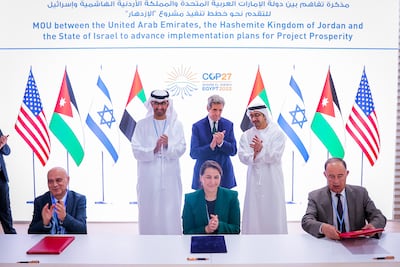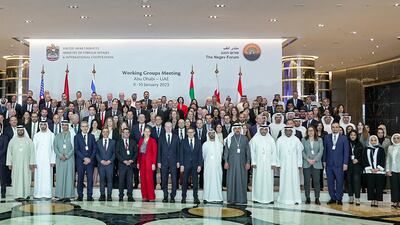The two-day Negev Forum working group meetings concluded in Abu Dhabi on Tuesday, with calls for more co-operation.
Talks between senior officials from the US, Israel, the UAE, Egypt, Bahrain and Morocco focused on areas including food security, water technology, clean energy, tourism, health care, education, coexistence and regional security.
The discussions are a result of the Negev Summit held last year in Israel, which was seen as the next step in the historic Abraham Accords, signed more than two years ago.
“Each of the countries that are represented here have other issues outside of the six working groups, but this is a great opportunity for us to work together and the Abraham Accords enabled this, that we can work together on issues that relate to all of us,” Ohad Horsandi, deputy ambassador at the Israeli embassy in Abu Dhabi, told The National on the sidelines of the meetings on Tuesday.
The next major event will be held in Morocco in March.
The steering committee’s gathering in Abu Dhabi is the third since the inaugural Negev Summit last March. The committee previously met in Bahrain in July and on Zoom in October.
According to the Abu Dhabi hosts, the talks aimed to “further build bridges of communication and dialogue and promote peaceful coexistence throughout the region”.
Speaking on the opening day of the forum, Israeli Foreign Ministry director Alon Ushpiz said the main task at the steering committee should be to help guide the working groups from theory to practice.
“At the next ministerial summit, to which we are all looking forward, we should stand ready to present clearly formulated concepts and projects that will demonstrate the true value of our shared work,” Mr Ushpiz said.
Michal Levy, chief scientist at Israel’s Ministry of Agriculture, said her discussions with the five other delegations proved productive in discussing the top challenges faced not only by the participating countries but also others in the region.
During the meetings in Abu Dhabi, Israel led both the education and tolerance working groups while it co-led the water and food security team alongside Morocco.
Among the key topics of discussions for these groups were the challenges of countries facing regional water security issues.
“Water and the reuse of water, how to recycle water, and how to use recyclable water in agriculture were among the key topics we discussed with our Arab counterparts,” Ms Levy told The National.
“Coming from countries with arid climates, we focused our discussion on how to best practise agriculture in desert areas and how to better irrigate to increase yield.”
The UAE’s Ministry of Climate Change and Environment signed a five-year agreement with Israel’s Ministry of Agriculture and Rural Development last year to co-operate in the field of agriculture.
Israel signed similar agriculture and food security deals with Bahrain and Morocco last year.
Speaking to reporters following the conclusion of discussions on Tuesday, the US delegation, headed by State Department counsellor Derek Chollet, said the talks in Abu Dhabi represented a significant shift in participation, as it hosted about 150 officials and delegates representing the different countries that make up the Negev Forum, the largest meeting between Israel and its regional partners since the Madrid Conference of 1991.
“There will be a ministerial meeting hopefully soon that our ministers will check our homework and ensure that we came up with tangible projects, but also set the agenda for the future,” Mr Chollet told reporters.
He also confirmed that the working groups would release a framework document that had been agreed to late last year which will lay out the goals, components and mechanisms of an annual ministerial meeting for member countries with a rotating presidency.
THE DEALS
Hamilton $60m x 2 = $120m
Vettel $45m x 2 = $90m
Ricciardo $35m x 2 = $70m
Verstappen $55m x 3 = $165m
Leclerc $20m x 2 = $40m
TOTAL $485m
Manchester City 4
Otamendi (52) Sterling (59) Stones (67) Brahim Diaz (81)
Real Madrid 1
Oscar (90)
Our legal consultant
Name: Hassan Mohsen Elhais
Position: legal consultant with Al Rowaad Advocates and Legal Consultants.
MATCH INFO
Fixture: Ukraine v Portugal, Monday, 10.45pm (UAE)
TV: BeIN Sports
ABU%20DHABI'S%20KEY%20TOURISM%20GOALS%3A%20BY%20THE%20NUMBERS
%3Cp%3EBy%202030%2C%20Abu%20Dhabi%20aims%20to%20achieve%3A%3C%2Fp%3E%0A%3Cp%3E%3Cstrong%3E%E2%80%A2%2039.3%20million%20visitors%2C%3C%2Fstrong%3E%20nearly%2064%25%20up%20from%202023%3C%2Fp%3E%0A%3Cp%3E%3Cstrong%3E%E2%80%A2%20Dh90%20billion%20contribution%20to%20GDP%2C%3C%2Fstrong%3E%20about%2084%25%20more%20than%20Dh49%20billion%20in%202023%3C%2Fp%3E%0A%3Cp%3E%3Cstrong%3E%E2%80%A2%20178%2C000%20new%20jobs%2C%3C%2Fstrong%3E%20bringing%20the%20total%20to%20about%20366%2C000%3C%2Fp%3E%0A%3Cp%3E%3Cstrong%3E%E2%80%A2%2052%2C000%20hotel%20rooms%2C%3C%2Fstrong%3E%20up%2053%25%20from%2034%2C000%20in%202023%3C%2Fp%3E%0A%3Cp%3E%3Cstrong%3E%E2%80%A2%207.2%20million%20international%20visitors%2C%3C%2Fstrong%3E%20almost%2090%25%20higher%20compared%20to%202023's%203.8%20million%3C%2Fp%3E%0A%3Cp%3E%3Cstrong%3E%E2%80%A2%203.9%20international%20overnight%20hotel%20stays%2C%3C%2Fstrong%3E%2022%25%20more%20from%203.2%20nights%20in%202023%3C%2Fp%3E%0A
Tips for taking the metro
- set out well ahead of time
- make sure you have at least Dh15 on you Nol card, as there could be big queues for top-up machines
- enter the right cabin. The train may be too busy to move between carriages once you're on
- don't carry too much luggage and tuck it under a seat to make room for fellow passengers
The biog
Mission to Seafarers is one of the largest port-based welfare operators in the world.
It provided services to around 200 ports across 50 countries.
They also provide port chaplains to help them deliver professional welfare services.
2019 Asian Cup final
Japan v Qatar
Friday, 6pm
Zayed Sports City Stadium, Abu Dhabi
The specs: 2019 Mercedes-Benz C200 Coupe
Price, base: Dh201,153
Engine: 2.0-litre turbocharged four-cylinder
Transmission: Nine-speed automatic
Power: 204hp @ 5,800rpm
Torque: 300Nm @ 1,600rpm
Fuel economy, combined: 6.7L / 100km
The%20specs%3A%202024%20Mercedes%20E200
%3Cp%3E%3Cstrong%3EEngine%3A%20%3C%2Fstrong%3E2.0-litre%20four-cyl%20turbo%20%2B%20mild%20hybrid%0D%3Cbr%3E%3Cstrong%3EPower%3A%20%3C%2Fstrong%3E204hp%20at%205%2C800rpm%20%2B23hp%20hybrid%20boost%0D%3Cbr%3E%3Cstrong%3ETorque%3A%20%3C%2Fstrong%3E320Nm%20at%201%2C800rpm%20%2B205Nm%20hybrid%20boost%0D%3Cbr%3E%3Cstrong%3ETransmission%3A%20%3C%2Fstrong%3E9-speed%20auto%0D%3Cbr%3E%3Cstrong%3EFuel%20consumption%3A%20%3C%2Fstrong%3E7.3L%2F100km%0D%3Cbr%3E%3Cstrong%3EOn%20sale%3A%20%3C%2Fstrong%3ENovember%2FDecember%0D%3Cbr%3E%3Cstrong%3EPrice%3A%20%3C%2Fstrong%3EFrom%20Dh205%2C000%20(estimate)%3C%2Fp%3E%0A
PSG's line up
GK: Alphonse Areola (youth academy)
Defence - RB: Dani Alves (free transfer); CB: Marquinhos (€31.4 million); CB: Thiago Silva (€42m); LB: Layvin Kurzawa (€23m)
Midfield - Angel di Maria (€47m); Adrien Rabiot (youth academy); Marco Verratti (€12m)
Forwards - Neymar (€222m); Edinson Cavani (€63m); Kylian Mbappe (initial: loan; to buy: €180m)
Total cost: €440.4m (€620.4m if Mbappe makes permanent move)
Most F1 world titles
7 — Michael Schumacher (1994, ’95, 2000, ’01 ’02, ’03, ’04)
7 — Lewis Hamilton (2008, ’14,’15, ’17, ’18, ’19, ’20)
5 — Juan Manuel Fangio (1951, ’54, ’55, ’56, ’57)
4 — Alain Prost (1985, ’86, ’89, ’93)
4 — Sebastian Vettel (2010, ’11, ’12, ’13)
ALRAWABI%20SCHOOL%20FOR%20GIRLS
%3Cp%3ECreator%3A%20Tima%20Shomali%3C%2Fp%3E%0A%3Cp%3EStarring%3A%C2%A0Tara%20Abboud%2C%C2%A0Kira%20Yaghnam%2C%20Tara%20Atalla%3C%2Fp%3E%0A%3Cp%3ERating%3A%204%2F5%3C%2Fp%3E%0A
Brahmastra%3A%20Part%20One%20-%20Shiva
%3Cp%3E%3Cstrong%3EDirector%3A%20%3C%2Fstrong%3EAyan%20Mukerji%3C%2Fp%3E%0A%3Cp%3E%3Cstrong%3EStars%3A%20%3C%2Fstrong%3ERanbir%20Kapoor%2C%20Alia%20Bhatt%20and%20Amitabh%20Bachchan%3C%2Fp%3E%0A%3Cp%3E%3Cstrong%3ERating%3A%3C%2Fstrong%3E%202%2F5%3C%2Fp%3E%0A
Results
2pm: Al Sahel Contracting Company – Maiden (PA) Dh50,000 (Dirt) 1,200m; Winner: AF Mutakafel, Tadhg O’Shea (jockey), Ernst Oertel (trainer)
2.30pm: Dubai Real Estate Centre – Maiden (TB) Dh60,000 (D) 1,200m; Winner: El Baareq, Antonio Fresu, Rashed Bouresly
3pm: Shadwell – Rated Conditions (TB) Dh100,000 (D) 1,950m; Winner: Lost Eden, Andrea Atzeni, Doug Watson
3.30pm: Keeneland – Handicap (TB) Dh84,000 (D) 1,000m; Winner: Alkaraama, Dane O’Neill, Musabah Al Muhairi
4pm: Keeneland – Handicap (TB) Dh76,000 (D) 1,800m; Winner: Lady Snazz, Saif Al Balushi, Bhupat Seemar
4.30pm: Hive – Conditions (TB) Dh100,000 (D) 1,600m; Winner: Down On Da Bayou, Royston Ffrench, Salem bin Ghadayer
5pm: Dubai Real Estate Centre – (TB) Handicap Dh64,000 (D) 1,600m; Winner: Lahmoom, Royston Ffrench, Salem bin Ghadayer
COMPANY PROFILE
Name: Xpanceo
Started: 2018
Founders: Roman Axelrod, Valentyn Volkov
Based: Dubai, UAE
Industry: Smart contact lenses, augmented/virtual reality
Funding: $40 million
Investor: Opportunity Venture (Asia)
Recipe: Spirulina Coconut Brothie
Ingredients
1 tbsp Spirulina powder
1 banana
1 cup unsweetened coconut milk (full fat preferable)
1 tbsp fresh turmeric or turmeric powder
½ cup fresh spinach leaves
½ cup vegan broth
2 crushed ice cubes (optional)
Method
Blend all the ingredients together on high in a high-speed blender until smooth and creamy.
The National's picks
4.35pm: Tilal Al Khalediah
5.10pm: Continous
5.45pm: Raging Torrent
6.20pm: West Acre
7pm: Flood Zone
7.40pm: Straight No Chaser
8.15pm: Romantic Warrior
8.50pm: Calandogan
9.30pm: Forever Young
Wicked: For Good
Director: Jon M Chu
Starring: Ariana Grande, Cynthia Erivo, Jonathan Bailey, Jeff Goldblum, Michelle Yeoh, Ethan Slater
Rating: 4/5
Learn more about Qasr Al Hosn
In 2013, The National's History Project went beyond the walls to see what life was like living in Abu Dhabi's fabled fort:
Brief scores:
Everton 2
Walcott 21', Sigurdsson 51'
Tottenham 6
Son 27', 61', Alli 35', Kane 42', 74', Eriksen 48'
Man of the Match: Son Heung-min (Tottenham Hotspur)



